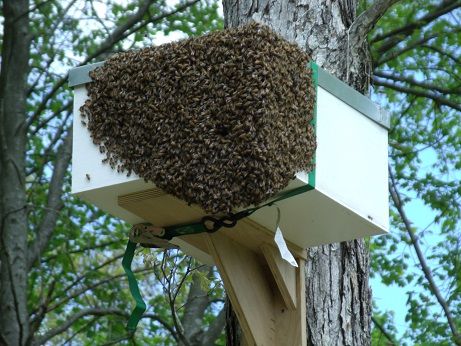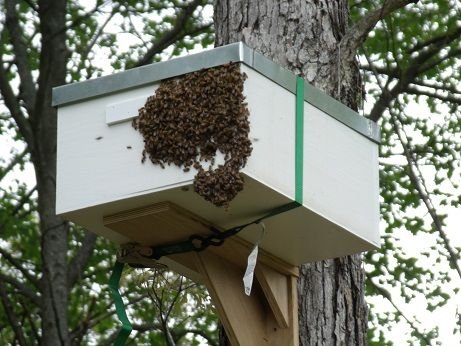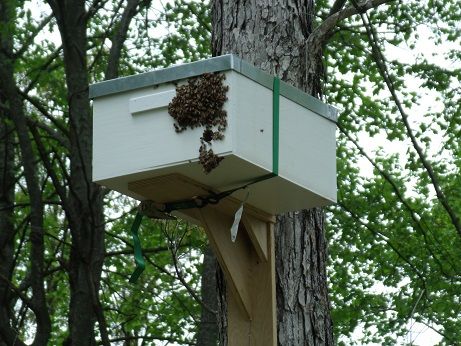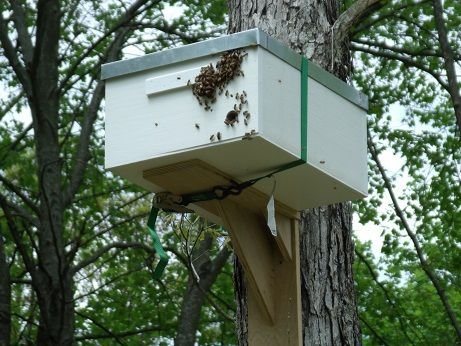Catching Swarms of Honeybees - Free Bees for Everyone!
My very favorite part about beekeeping is catching swarms. Each spring the honeybee colony will try to reproduce by making a bunch of new queen cells and just before the new queens hatch the old queen and half of the worker bees will leave the hive and look for a new place to live.
If you are lucky enough to be standing nearby you'll see the hive erupt in activity as thousands of bee pour out of the hive and take to the air. The bees are quite docile during swarming but the swirling cloud of insects is very intimidating. After a few minutes the swarm usually settles on a tree branch and forms a solid looking mass with the queen in the center. I caught the swarm in the picture above at this stage by cutting the entire branch free and shaking the bees off into an empty hive.
Scout bees will fly out and explore every available nest site in the neighborhood until they find an inviting location. From the colonies point of view, the ideal nest site
- is up off the ground out of the reach of bears
- has a volume of about 40 L
- has an opening that is about 4 cm in diameter
- smells like beeswax and propolis
You can also catch a swarm by building an artificial nest site that meets their requirements and placing it near a hive that is likely to swarm. A drop of lemongrass oil or a commercial product called Swarm Commander also helps.
The series of pictures shows a nice big swarm on the outside of a swarm trap as they moved into their new home.




I usually leave the bees in their new home for a few days so that they can start building some comb on the frames in the trap. Swarms are usually eager to build comb, so you really need to give them a good place to build it. If you just catch the swarm in an empty box they will build comb all over and you will have to cut it all out to move them into a new home. Trust me, nobody is going to enjoy that process.
If you are lucky enough to know the location of a wild bee tree, swarm trapping is an excellent way to propagate their genes without harming the mother colony at all. It also works to catch swarms that might escape from a managed colony.
Even if I never harvested a drop of honey from these bees it was so much fun to catch them that I would probably do it anyway.
Wow you are a brave man! You ever got stung before or probably got used to it. haha
Nice to see you here mate and hope to see you around :)
I get stung once or twice a week. It only hurts a lot the first few stings of the season.
I've seriously pondered getting a hive of honey bees. I know next to nothing about them though, so it wouldn't be for a while probably. Thanks for this, it was very interesting.
It seems like a relatively low-effort hobby when you first look into it, but the time and money commitments grow very quickly. I love it, though. They are so fascinating.
That's really neat. My lingering fear of bees (much better than when I was a child) would probably prevent me from ever tying this, but there is a distinct beauty to it.
The thing that you can't get from a picture or video is the fantastic smell. The hive smells like wax, honey, and propolis, of course, but the bees themselves have their own animal-scent that is wonderful. It smells like puppy fur.
Wow, I've never heard of that before, but I guess it's to be expected. I do yet I don't want to experience that sometime...
I love swarm season, only caught one this year. =(
This is the only one that I bagged this year. The swarm was on the branch just above the top of the ladder, so I just shook them off the branch into the box. I had another swarm that I could have caught if I had been prepared. They moved into a hollow tree behind my workshop instead. Maybe they will survive the winter and give me a swarm next spring.
That's awesome! I've always wanted to farm honey bees when I have the land. Sounds like fun! haha
It doesn't take much space, but moving a hive is a pain, so it is better if you are settled down in one place.
Swarms is definitely the way to do it! That's how I want my first colony! Sadly, there are no the many honey bees out here it seems. I saw them for one week and they've not reappeared since. I've only had this property since December, so I am still working on developing an enticing bee loving flower area. I hope more return in the next year.
But since they were here, the hive cannot be TOO far. I just wish there was a way to tell between a person's hive and a wild hive. Haha
You can follow the bees from their foraging area back to the hive. The process is called bee lining. I tried it once last year with no luck.
I'm going to try again this year. If it works Ill make a post about it.
I've tried for honey bees and yellow jackets. I just lose sight so easily. :(
man, i've never been able to catch em in a swarmbox... they always prefer clumping together in a tree close by though...
I really need to test that trick with some lemongrass oil... maybe that helps!
Ive never tried Swarm Commander but the beeks who use it swear it is the best.
I'll try lemongrass oil first... just the smell of propolis & wax doesn't seem to do the trick for me at least
Swarms used to be common in my area, but they have just dropped to nothing over the past few years. That's how I got my first hive. I thought to myself one night in the spring, "I sure would like to have some bees." And the very next day there was a swarm, low down, in one of my trees. I live in a town with a bee supply store, so I just went to buy a hive box and a headnet. And then I had some bees, lol. I was so scared, I put duct tape around the neck of my headnet and around my gloves, lol. In later swarms, I didn't even use gloves, they are so docile, as you well know. But I lost all my bees a few years ago to colony collapse and haven't seen a single swarm since, either. At least I still have a lot of honey left from all the hives I had. Enjoy your bees -- they are so special! :D
Sorry to hear about the colony collapse. I've had some small, late swarms that just never seem to grow, but I've never had a strong colony die off. When I started taking the beekeeping a little more seriously in 2014 I tried to increase my hive count as much as I could so that I could make up for lost hives. Now I'm starting to give some away to help new beeks get started. I'm also trying a little harder to manage some colonies for honey production.
Congratulations! This post has been upvoted from the communal account, @minnowsupport, by professorbromide from the Minnow Support Project. It's a witness project run by aggroed, ausbitbank, teamsteem, theprophet0, and someguy123. The goal is to help Steemit grow by supporting Minnows and creating a social network. Please find us in the Peace, Abundance, and Liberty Network (PALnet) Discord Channel. It's a completely public and open space to all members of the Steemit community who voluntarily choose to be there.
If you like what we're doing please upvote this comment so we can continue to build the community account that's supporting all members.
Hey there! I just wanted to inform you that your article has been included and linked in the most recent issue of the Weekly Homesteading Newsletter! Please check it out if you have the time! Thank you and have a great day!
Thanks @kiaraantonoviche. I enjoyed the newsletter this week. Too bad we have to wait until May 2018 to try the fried Locust blossoms. That looked so good!